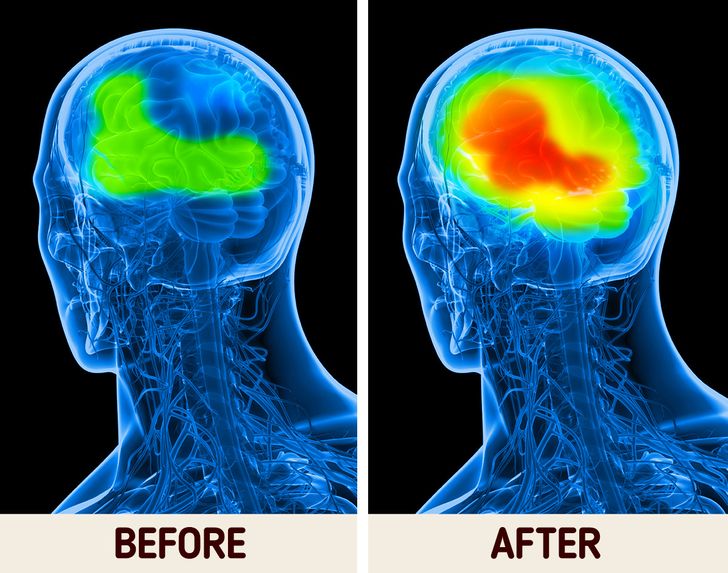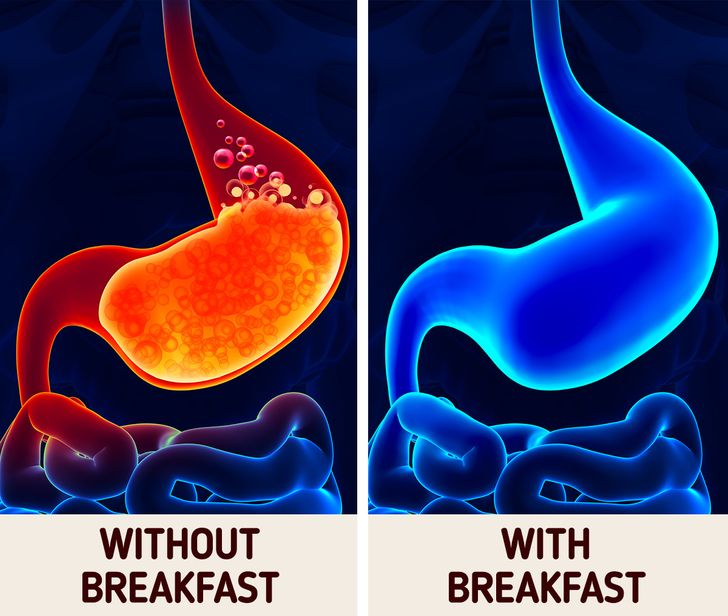Lifestyle
What Happens to Your Body If You Skip Breakfast Every Day.
Published
5 years agoon
By
Adubianews
Breakfast is commonly referred to as “the most important meal of the day.” But that raises the question of whether or not this statement is true or just a myth. Approximately 25% of Americans skip this meal every day and it has even become a trend to do so.
We decided to study the different benefits and disadvantages of eating breakfast and would like to share what we learned with you.
1. You can gain weight.

Despite the idea that skipping breakfast every day can lead to weight loss, it’s not totally right. Some research has shown that staying hungry in the morning can be linked to obesity, not just in children and younger populations, but also among the elderly.
This may happen because skipping breakfast can make people binge later on. Eating before bed leads to weight gain. But one study also showed that skipping breakfast can cause weight gain even if you don’t overeat for the rest of the day because the body’s internal clock gets disrupted.
2. Your mood gets worse.

Skipping breakfast is associated with mood disorders among adults. People who don’t eat in the morning tend to have depression more often. Also, skipping the first meal of the day 4 or 5 times a week can lead to an increased risk of developing type 2 diabetes by 55%. It can also be connected to low blood sugar levels.
When one’s blood glucose level goes down, it results in rapid mood changes, like general moodiness and irritability. That’s why it shouldn’t be lower than 70 milligrams per deciliter (mg/dL).
3. You feel tired between 12 p.m and 4 p.m.

In the morning, after a long break without food, your glycogen stores are low and you need more energy to work productively. Once you have breakfast, your body starts to break down fatty acids to produce the energy it needs. If you don’t have breakfast, even if you feel good in the morning, you may feel very exhausted in a couple of hours. You also may struggle to focus on things and feel fatigued in the afternoon.
4. Your brain can get sharper.

Researchers have found that intermittent fasting has several beneficial effects. This type of eating means that you go through fasting periods each day (normally they consist of 8 hours of eating and 16 hours of fasting). So if you skip breakfast to complete these 16 hours, it may actually be good for your brain, and your memory can be improved.
However, if it’s not in the form of intermittent fasting, another study has revealed that skipping meals can have a negative effect on brain activity.
5. Your aging process could be reversed.

It may be hard to believe, but skipping breakfast can reverse aging. Calorie restriction and intermittent fasting can help increase growth hormones and lower your insulin levels. However, some people may choose to skip dinner instead.
6. Your level of acidity increases.

7. You may feel dizzy and suffer from headaches.

Improper dieting and meal-skipping can trigger headaches or migraines. Experts say that even delayed or irregular breakfasts can affect your body. This is usually due to people’s blood-glucose levels falling too low.
Headaches produced by a lack of food are often severe and can be accompanied by mild nausea. There are also some other symptoms that can include yawning, pallor, and sweating.
8. Your cortisol level can rise.

Skipping breakfast may lead to an increased level of free cortisol because your body can perceive it as a stressful event. As a result, you may experience anxiety and irritability. You may want to get a blood test to check if your psychological condition is connected to your cortisol level.
9. You put yourself at higher risk for heart disease.

People who regularly skip breakfast are about 21% more likely to suffer from heart disease. It’s also important to pay attention to what you eat in the morning. A single doughnut won’t be enough to give your body the necessary nutrition to help your body function well.
10. Your breath can get worse.

11. Your menstrual cycle can be disrupted.

Research has shown that skipping breakfast can be linked to an irregular menstrual cycle. It also increases premenstrual pain and cramps. If you tend to have such things, it’s better to start eating good meals in the morning.
How often do you skip breakfast? What time do you normally have your first meal of the day?
You may like
-


NPP Communicator Blames Mahama in Interview Over Viral Video Controversy
-


NPP Unveils Nationwide Reorganisation Timetable Ahead of 2026 Internal Elections
-


MPs Demand Tougher Action as Human Trafficking Cases Rise in Ghana
-


Abu Jinapor Demands Urgent Reforms to Address Ghana’s Cocoa Sector Challenges
-


Felix Kwakye Ofosu Defends Mahama Over Cocoa Pricing Remarks, Slams NPP Criticism
-


Asiedu Nketia Uses NDC Thank You Tour to Collect Feedback on Government
-


Speaker Urges Executive to Grant Parliament Permanent Land
-


Finance Expert Warns Cocoa Reforms Could Worsen COCOBOD Debt
-


Jinapor Swears In New VRA Resettlement Trust Fund Board

















